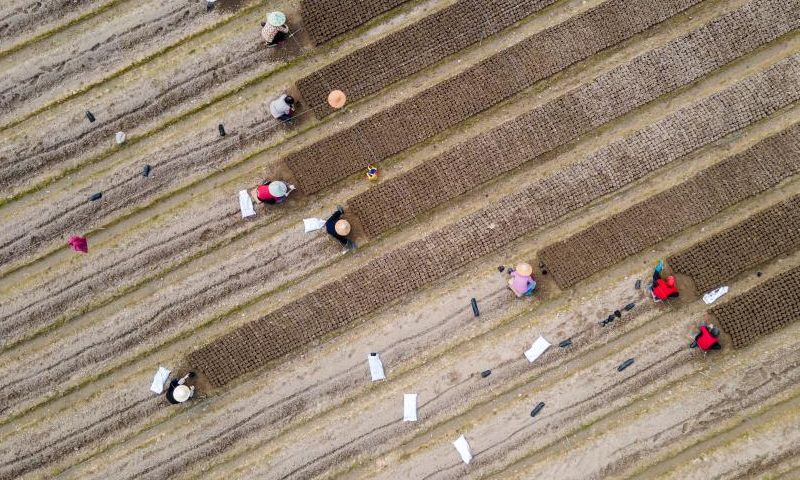
This aerial photo taken on Feb. 18, 2023 shows farmers working in a field in Sumeng Town of Jinhua City, east China's Zhejiang Province. Yushui (Rain Water), the second of China's 24 solar terms, falls on Feb. 19 in the year 2023. The arrival of Yushui will see rises in temperature, more frequent rainfall, and a wave of spring farming activities across China. Photo: Xinhua
Multinational conglomerates in the agricultural industry are expanding investment in digital agriculture and smart farming, a key area highlighted in China's "No.1 central document" for 2023, seeking to integrate their development strategy with China's rural vitalization.
Charoen Pokphand Group said in a recent interview with the Xinhua News Agency that it plans to launch around 100 modern agricultural science and technology industrial parks as part of the group's development strategy for 2023.
The parks will integrate land improvement, planting and breeding, agricultural product processing, cold-chain logistics, e-commerce finance, talent training, ecological tourism and regional cultural inheritance, according to the group.
Liu Linlin, a senior executive of Cargill, revealed that digitalization, which is the big trend of agriculture and animal husbandry, will be the development direction of Cargill.
"In addition to the use of intelligent manufacturing means in production, such as automated production, big data analysis application and digital intelligence run through all aspects of Cargill's agricultural supply chain," Liu said.
The efforts and development direction of the multinational companies are in line with China's increased efforts in pursuing agricultural modernization.
A key official document released earlier this week, the "No.1 central document" for 2023, said China will strengthen support for agricultural science, technology and equipment this year.
Agricultural multinationals have noticed new growth opportunities brought by progress in China, where digital technologies are increasingly used for modern agriculture, Nie Fengying, deputy director general of the Center for International Agricultural Research at the Chinese Academy of Agricultural Sciences, told the Global Times on Wednesday.
Investment in upgrading technologies to become more efficient and intelligent has become the focal point in recent years, according to Nie.
According to the document, China will continue to pursue digital development in rural areas, explore different scenarios for the application of digital technology, accelerate big data development, and advance smart agriculture.
The broad use of digital tech including big data in farming and livestock feeding could save time and labor and enhance farming efficiency, which has become an unstoppable trend, Nie said.
"With the progress of China's urbanization, the labor force has been shifting away from farms, leading to labor shortages in the traditional agricultural operation," Nie said.
Data from the Ministry of Agriculture and Rural Affairs showed that the comprehensive mechanization level of crop cultivation, planting and harvesting had risen from 57 percent in 2012 to 72 percent in 2021.
China's digital agricultural efforts also extend to the e-transformation of rural areas, which is expected to help multinational companies expand markets in lower-tier cities, experts said.
The document encouraged cultivating new industries and business models in China's rural areas, such as setting up live-streaming e-commerce bases, developing high-quality rural tourism, promotion of digital application scenarios, and enhancing the application of big data and AI in agriculture.
Digital transformation is conducive to improving the income level of farmers, which will release massive consumption in the country and drive economic growth, Hu Qimu, deputy secretary general of the digital-real economies integration Forum 50, told the Global Times on Wednesday.
"Lower-tier cities have huge potential in propelling rural revitalization, which is why foreign companies have been increasing their presence in these areas during recent years," Hu said.
In 2022, China's online retail sales of farm produce stood at around 530 billion yuan ($77.5 billion), up 9.2 percent year-on-year, official data showed. China aims to bring that number to 800 billion yuan by 2025, according to the national agriculture and rural development plan for the 14th Five-Year Plan period (2021-25).




